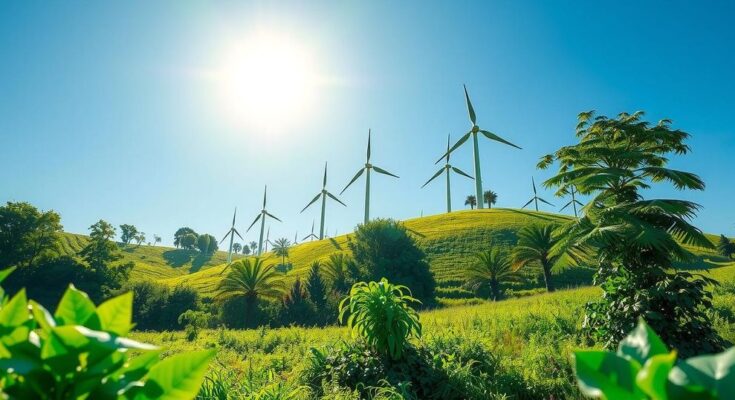UN Climate Change Executive Secretary Simon Stiell urged Nigeria to prioritize climate action as a path to economic growth. He highlighted Nigeria’s ambitious goals, the need for a robust national climate plan, and the importance of financial support for sustainable development. Stiell emphasized the role of clean energy and mangrove forests in fostering resilience and economic prosperity.
In a recent address at a symposium in Nigeria, UN Climate Change Executive Secretary Simon Stiell emphasized the importance of climate action as a vital component of Nigeria’s economic growth. He commended the government’s ambitious plan to uplift 100 million citizens from poverty while pursuing a 7% growth rate. Stiell highlighted that these transformative goals can significantly change lives by addressing critical issues such as energy accessibility for over 85 million Nigerians lacking electricity.
Stiell noted that Nigeria’s potential as Africa’s largest economy includes its abundant resources, such as solar and wind energy, essential for clean energy development. The dynamism and entrepreneurial spirit of the Nigerian people further enhance this potential. He asserted that countries investing in clean energy stand to benefit the most from the anticipated $2 trillion global market.
He called for a strong national climate strategy, stressing the need for Nigeria to develop its Nationally Determined Contribution under the Paris Agreement. Such measures could stimulate economic growth through clean infrastructure and sustainable agricultural practices vital for 70% of the population engaged in farming.
However, Stiell pointed out that financial support is crucial for implementing these initiatives, urging improved access to international climate funds. He mentioned Brazil’s efforts to enhance global climate finance for developing nations and the necessity for Nigeria to secure financial backing to foster job creation and attract investment in green sectors.
Furthermore, Stiell underscored the profound risks posed by climate inaction, manifesting already through adverse weather effects that could further diminish GDP. He advocated for investments in climate adaptation strategies, including effective water management and flood protection measures, as part of the necessary economic stability plans.
Stiell praised Nigeria’s extensive mangrove forests, which serve as significant carbon sinks, providing coastal protection against erosion and storms. He concluded by reiterating the need for inclusive participation in climate initiatives, pledging the UN Climate Change commitment to collaborate with Nigeria and other nations in addressing climate challenges effectively.
In conclusion, Simon Stiell’s remarks highlight the critical nexus between climate action and economic advancement in Nigeria. As the country pursues ambitious growth targets, incorporating sustainable practices and securing financial support are essential. The protection and expansion of mangrove forests, coupled with strong national climate policies, can foster resilience and long-term prosperity. Collective efforts in climate action are imperative for Nigeria to realize its potential benefits.
Original Source: www.miragenews.com




